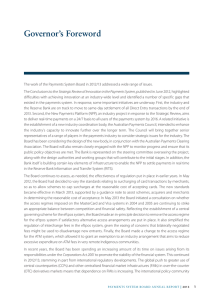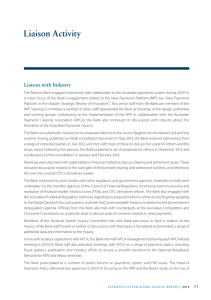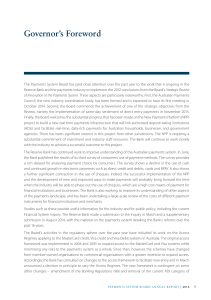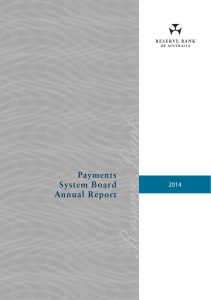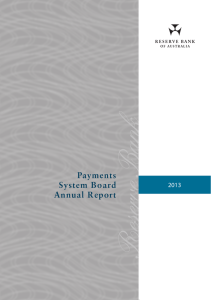Governor’s Foreword
advertisement
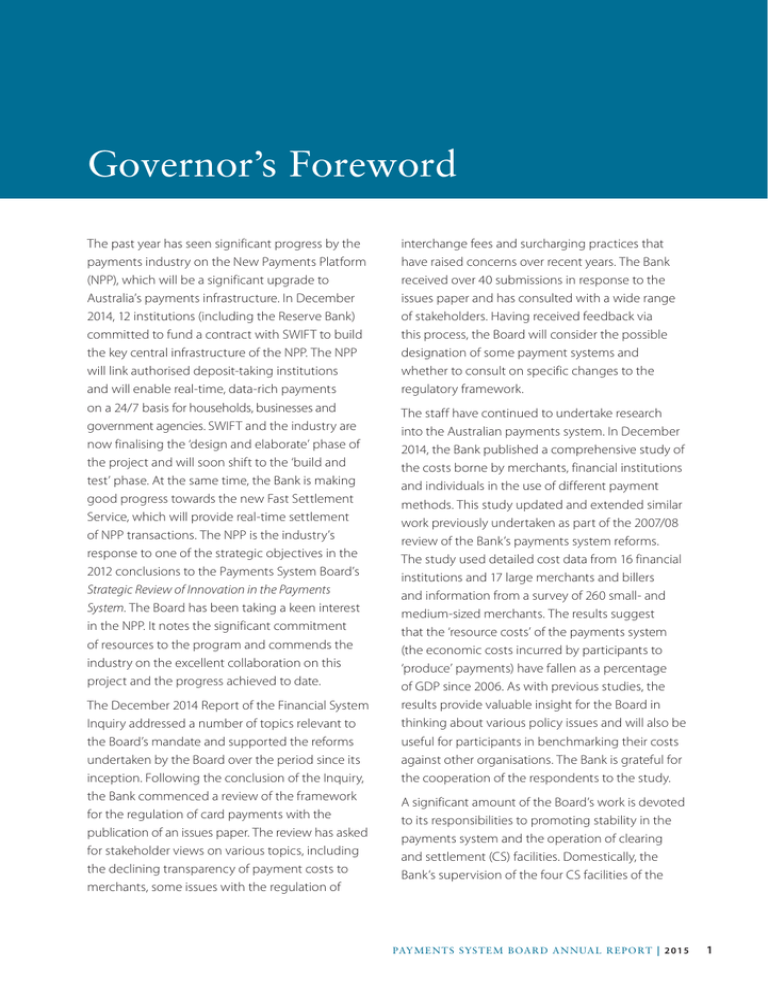
Governor’s Foreword The past year has seen significant progress by the payments industry on the New Payments Platform (NPP), which will be a significant upgrade to Australia’s payments infrastructure. In December 2014, 12 institutions (including the Reserve Bank) committed to fund a contract with SWIFT to build the key central infrastructure of the NPP. The NPP will link authorised deposit-taking institutions and will enable real-time, data-rich payments on a 24/7 basis for households, businesses and government agencies. SWIFT and the industry are now finalising the ‘design and elaborate’ phase of the project and will soon shift to the ‘build and test’ phase. At the same time, the Bank is making good progress towards the new Fast Settlement Service, which will provide real-time settlement of NPP transactions. The NPP is the industry’s response to one of the strategic objectives in the 2012 conclusions to the Payments System Board’s Strategic Review of Innovation in the Payments System. The Board has been taking a keen interest in the NPP. It notes the significant commitment of resources to the program and commends the industry on the excellent collaboration on this project and the progress achieved to date. The December 2014 Report of the Financial System Inquiry addressed a number of topics relevant to the Board’s mandate and supported the reforms undertaken by the Board over the period since its inception. Following the conclusion of the Inquiry, the Bank commenced a review of the framework for the regulation of card payments with the publication of an issues paper. The review has asked for stakeholder views on various topics, including the declining transparency of payment costs to merchants, some issues with the regulation of interchange fees and surcharging practices that have raised concerns over recent years. The Bank received over 40 submissions in response to the issues paper and has consulted with a wide range of stakeholders. Having received feedback via this process, the Board will consider the possible designation of some payment systems and whether to consult on specific changes to the regulatory framework. The staff have continued to undertake research into the Australian payments system. In December 2014, the Bank published a comprehensive study of the costs borne by merchants, financial institutions and individuals in the use of different payment methods. This study updated and extended similar work previously undertaken as part of the 2007/08 review of the Bank’s payments system reforms. The study used detailed cost data from 16 financial institutions and 17 large merchants and billers and information from a survey of 260 small- and medium-sized merchants. The results suggest that the ‘resource costs’ of the payments system (the economic costs incurred by participants to ‘produce’ payments) have fallen as a percentage of GDP since 2006. As with previous studies, the results provide valuable insight for the Board in thinking about various policy issues and will also be useful for participants in benchmarking their costs against other organisations. The Bank is grateful for the cooperation of the respondents to the study. A significant amount of the Board’s work is devoted to its responsibilities to promoting stability in the payments system and the operation of clearing and settlement (CS) facilities. Domestically, the Bank’s supervision of the four CS facilities of the PAY ME N TS SYSTE M B OAR D AN N UAL R E P O RT | 2 0 1 5 1 ASX Group over the past year has continued to focus on financial risk management, most notably the ASX central counterparties’ (CCPs) stress-testing frameworks, as well as enhancements to the facilities’ recovery arrangements that aim to ensure a return to viability in the event of an extreme financial shock. The Board has also taken a keen interest in the ASX’s response to the default in mid May of BBY Limited, a broker participant of ASX Clear Pty Limited. It notes that the incident was handled well, but has nevertheless suggested a few matters for further consideration in the spirit of continuous improvement. There is also an increasingly significant international dimension to the Board’s supervision of CS facilities. The largest provider of clearing services in the Australian dollar over-the-counter interest rate derivatives market is an offshore licensee, LCH. Clearnet Limited (LCH.C Ltd), and all four major domestic banks are now direct clearing participants. Given the systemic importance of this market, the Bank has imposed certain requirements on LCH.C Ltd to structure its operational and governance arrangements to promote stability in the Australian financial system, including by opening an Exchange Settlement Account with the Bank, becoming an Austraclear participant, and maintaining holdings of high-quality Australian dollar assets in Australia. A second offshore licence application, from CME Limited, was approved in September 2014. The Board continues to take a close interest in both domestic and international policy developments relevant to its work on financial market infrastructures (FMIs). Domestically, much of this work continues to be carried out collaboratively with other agencies of the Council of Financial Regulators (CFR). One important element has been the CFR’s review of competition in clearing of Australian equities. Another important CFR workstream has been on resolution arrangements for FMIs, which aim to prepare for any event where an FMI suffered a severe shock to its viability and 2 R ES ERV E BA NK OF AUS T RA L I A its own efforts to recover were unsuccessful. The government is currently consulting on a framework that would make the Bank the resolution authority for CS facilities, with an overarching objective to maintain overall stability in the financial system and an additional key objective to maintain the continuity of critical FMI services. Given that many domestic supervisory and policy priorities relating to FMIs are a reflection of international regulatory developments, the Bank has remained strongly engaged in the international community’s post-GFC work agenda. As the role of FMIs within the financial system has expanded, there is an increasing awareness of their growing systemic importance. This has been reflected in the development of an international CCP Workplan, which involves both the international committees with standard-setting responsibility for FMIs (the Committee on Payments and Market Infrastructures and the International Organization of Securities Commissions), and the committees with standardsetting responsibility for key participants of CCPs (the Basel Committee on Banking Supervision and standing committees of the Financial Stability Board, an international body that monitors and makes recommendations about the global financial system). The CCP Workplan is focusing on issues in the areas of CCP resilience, recovery and resolution, mirroring some of the matters on which the Board has focused in the domestic context. Once again the Board joins me in thanking the staff and management of the Bank for their work in helping the Board meet its mandate for efficiency, competition and controlling risk in the Australian payments system. Glenn Stevens Chair, Payments System Board 5 September 2015

